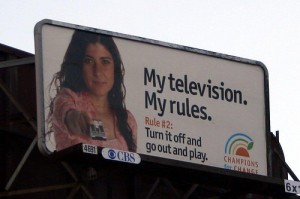Better Off than 40 Years Ago?
 Veronique de Rugy asks, “Are You Better off Than You Were 40 Years Ago?“ Well, she notes, our standard of living is wildly higher:
Veronique de Rugy asks, “Are You Better off Than You Were 40 Years Ago?“ Well, she notes, our standard of living is wildly higher:
Wealth expands people’s choices, and Americans are fabulously more prosperous than they were in 1968. According to the Census Bureau, income per capita adjusted for inflation has doubled in the four decades since 1968, from $13,374 to $26,804. Non-wage compensation, in the form of employee benefits, has also increased greatly during that time.
There’s a better measure of living standards than raw wealth: consumption. By this measure, the United States is also doing very well. Luxury goods that few could afford in 1968 are now standard in most households, including poor ones. Writing in the July/August 2008 American, Michael Cox and Richard Alm, the senior vice president and chief economist and the senior economics writer at the Federal Reserve Bank of Dallas, reported that in 2005 a full 85 percent of households that are classified as poor by the Census Bureau have air conditioning (compared to only 36 percent in 1971); 97 percent have a color television (compared to 40 percent in 1971); 40 percent have an automatic dishwasher (as opposed to 20 percent in 1971); and almost 100 percent own a refrigerator (a 25 percent increase over 1970).
Look no further than your morning routine. The federal government has put its imprimatur on the mattress on your bed (through the Consumer Product Safety Commission). The Federal Communications Commission regulates the transmission and content of your favorite morning show. The Food and Drug Administration (FDA) and U.S. Department of Agriculture (USDA), as well as the Commodity Futures Trading Commission, regulate the coffee you drink and the sugar you add to it. The USDA regulates the milk you pour in the coffee, as well as cheese, butter, and other dairy products you might eat for breakfast. And the FDA has its say about the shampoo, soap, and toothpaste you use with water that’s regulated by the Environmental Protection Agency.
Then there is the explosion in security measures. Airline travel regulations, increased surveillance, and growing databases are a few examples of government’s expansion in our lives. Add in state and local regulations—on smoking, eating transfats, or labeling menus—and you can get the feeling that we’ve lost our freedom.
Only the most die-hard libertarians, though, consider themselves oppressed because of shampoo regulations. The Homeland Security nightmare is quite annoying, though, especially considering that it brings zero increase in safety.
Still, some perspective is needed:
Looking at the whole social picture, it’s hard to tell blacks, Jews, gays, and women that they are less free today than they were in 1968. As a woman, I can enter and leave the work world freely, whether I have kids or not. I can get an abortion, file for divorce, enter into a lesbian relationship, marry a black guy, or have several lovers, all without worrying about legal consequences (or being drummed out of polite society). While some restrictions persist, the breakdown of social barriers, many of them formerly enforced by government edict, has done much to increase my freedom and that of other once-restricted groups.
So is everyone freer today than in 1968 except for white men? Not exactly. White males—and men in general—are freer in an important way too. Just as it is today, in 1968 the U.S. was engaged in a war. But back then, the country had a partially drafted army, not the all-volunteer force that fights today. Draftees accounted for 30.4 percent (17,725) of combat deaths in Vietnam. The number of draftee deaths in Iraq: 0.
Not discussed are measures of freedom aside from governmental coercion. People seem afraid to let their kids play outside or walk to school, for example, neither of which was generally true a generation ago. We’ve got less free time than our 1968 predecessors had and our free time is less free than it was then. The right of married women to work outside the home became the near necessity of their doing so.
Still, I wouldn’t prefer to live in 1968. Would you?
Photo by Flickr user doegox under Creative Commons license.





Given the choice between today and the ‘great society’, no. See, there’s the problem with the question; The assumption is inherrent in that question that government was less intrusive then.
My dad has said to me that 1967 was the best year he ever had: he had three kids and a new car and negligible debt. It was an odd statement to me, because his income multiplied several times after that; he was a true self-made man.
He patiently explains to me each time I bring that up to him (I deliberately test him occasionally to see if he is consistent with such comments) that the cultural and economic context was so great then that it was a huge jump in quality of life.
He had less money but more peace of mind. He is a live and let live sort of man who disliked but ignored the unrest of the hippies, etc.
Overall, I took his point to be that America then seemed full of hope and true, feel-it-in-your-bones prosperity. Every year would be better than the next. There was no substitute for that. As a boy, I remember not being allowed to trick or treat, to walk to school, the AIDS panic of the 80s, and the media barrage that Gen Xers wouldn’t fare as well as their parents. The Wall may have fallen, and consumer electronics is fantastically superior now, but I see his point.
The 00’s seem to me the decade that history broke America over its knee – Iraq showed we weren’t as strong as we showed ourselves to be, the financial mess showed we weren’t as wealthy and stable as we claimed to be, our embrace of torture showed we weren’t as noble and ethical as we said we were, the Imperial Presidency showed we didn’t believe in our own political roots any more, and Katrina, most pitifully, that we wouldn’t even take care of our own. At every level, America is mostly hype, advertising.
Even if I materially succeed nowadays, the America I live in is a degraded, pathetic mess that I cannot be proud of, although I am immensely proud of her ideals even now.
I just might take my father’s prosperous, up-looking America with a bright future for his family than the one I live in now that fears pedophiles in every mall, a terrorist attack in every airport, and two messy wars and a near-depression that threatens us all.
His position seems more rational all the time to me.
Now what do we have – more channels, debt, and threat. Big deal. FWIW
The question deserves more than a passing yes or no dismissal. If you take technology out of the equation, try and list the things that are better and the things that are worse. In 1968, at the age of 9, I could leave my house in the morning and play baseball in the park unsupervised all day with other neighborhood kids and return home for supper. As you noted, no one can even imagine such a thing today. How would the other parents at the PTO look at me if I let my 12-year old daughter try to do that? Remember when elections were effectively over on election day? Remember when your parents had one employer for their entire working lives?
No answer to this question can be complete with looking at what we’ve lost as well as what we’ve gained. We are almost unbelievably more prosperous and at the same time almost utterly convinced that the world is falling apart at the seams for ever smaller “crises.” Can you imagine Oprah or Dr. Phil making it in 1968?
Cable TV and cell phones mean the workday never stops and it takes real effort now to have a family meal every night during the week. Social Security was still solvent! The Cubs were a year away from truly breaking another generation’s hearts, and NASA was a year away from putting a man on the moon. Meanwhile, we’ve traded a fear of Russian nukes for a fear of terrorist nukes. The transition from an industrial economy to a service economy is almost complete, for better or worse.
Ah well, back to work…
I wonder if that’s just because he was younger then – often the early 20’s are the best times of our lives because we’re healthy, independent, and have most of our lives ahead of us.
I can’t think of a meaningful way to measure “better off compared to 40 years ago” on a society wide scale, there are far too many factors and trade-offs.
Charles,
I wonder, though, whether kids are any less safe now than then? Maybe all that’s changed is the hyperawareness of danger nowadays?
Having one job your whole life is less stressful than the current model but at a steep price in productivity.
Phil Donahue started his show in 1967, actually, going into national syndication in 1970. I’m not sure Oprah isn’t uplifting by comparison.
Agreed on cell phones and email being a burden. They’re also a joy, though. Remember when we used to think about how much it cost to make a “long distance” phone call? Or if you broke down somewhere you basically had to find a pay phone?
Hmmm. 40 years ago is a bad example for me since I was at my very poorest, putting my self through school at the time. I can, however, say with great confidence that I was much better off 30 years ago than I am now.
I was freer and materially better off. A key difference: I’m paying a much higher proportion of my income out in taxes than I used to and my income isn’t so high today that it makes up the difference in disposable income.
A lot of today’s prosperity is attributable to two-income families. What are the hidden costs to society of of kids spending so much less time with their mothers when they are young? My Mom took me to the library three times a week. In first grade I was reading at 5th grade level, by fifth grade I was at 12th grade level. My parents spent endless hours on our education at home, they did not leave it all to the schools
My father was a successful attorney, yet when I was a kid we had one TV and one stereo (Dad had a smoking audiophile system), the result was we watched TV together and listened to music together. The kids where not alone in their rooms with a TV set. Any TV show we watched had to have my parent’s approval.
And like many other posters, I could go anywhere in town without fear from my safety. And any father in town could call my Dad if I was out of line, and my ass would be grass.
Perhaps its a function of middle age, but I feel sorry for kids growing up now.
I’m curious about that. Is it actually less safe for your kids to go out and run around than it was, say, 40 years ago (note that this doesn’t apply to “obvious” nos, like letting your kids run around in downtown Detroit)? Crime went up and up for a while, but then started undergoing major declines.
The common refrain from the stats people is that the rate of murder, abduction etc for young people hasn’t changed much one way or the other over the past decades – what’s changed is people’s awareness of it.
And its hard to just compare incomes, as what we’re buying is also different. How much would it have cost you to be able to watch movies in your house in 1967 – and how many would you have been able to rent or buy in the first place? Or play computer games? Could you buy the same wide selection of foods back in the 60’s? Some things didn’t even have good analogies – for instance, what compared to the internet? Or many of the pharmaceutical products and medical procedures that we have now?
On the other hand, I recall my doctor telling me that the peak of good health for North America occurred in 1947 – no idea how they measured that though.
A few things about this very interesting subject:
1) I am of the opinion that children aren’t significantly less safe than they were 40 years ago. Are there more copycat predators out there? Perhaps. But abduction is pretty rare, and is probably done more by a divorced parent than anybody else.
2) It was mentioned only briefly in the posted article, but ask any black person whether they’d rather live in 1967 or 2008. I’m guessing the answer would be nearly unanimous, and for that we should be proud.
3) I miss being in my 20s as well. As much as I like my wife and kids, it would be nice to just run off for the weekend with some beautiful girl with no responsibilities to speak of.
I am convinced that, on balance, things aren’t really more dangerous now, but that we are simply far more aware of the dangers (and I speak as the father of three young boys).
For example: my parents’ van had no seatbelts in the back when we were kids and we loved to ride in the back and get tossed in the air when Mom hit a bump. We frequently played in the floor while we went on road trips. Yet now, my kids are allowed to do none of those things. Why? Is is inherently more dangerous to drive now than then? No, it is just that we are more cognizant of the dangers of driving sans seatbelts.
of course, too, more population means more drivers and and more people to cause trouble
And heck, if some kid was kidnapped in CA, no one knew, because there was no 24/7 cable news with live satellite feeds.
and of course if this is a simple average it’s much more likely that it represents wildly increasing income inequity. My guess would be that if you looked at income stratification it would be much more equitable in 68. If it turns out this is household not per capita, then the state is useless on it’s face.
Also you need to balance per capita income vs. per capita debt which I have to believe is off the scale. I mean we could have had much more luxury goods in 68 had credit been as loose as it has been (perhaps no more). I Would love to se how we would fare in the consumer market with the same credit standers now that were in place in 68. Consumer spending would sink mighty.
The whole article is poorly argued and not convincing to anyone who would look at it critically.
Still, I wouldn’t prefer to live in 1968. Would you?
Hell No. The tendency of people to look back longingly at the past is a cognitive error. I remember certain times in my life that now seemed great, and then I remember that I was miserable at the time. We tend to remember the good parts and forget the bad.
In 1968, btw, before the EPA came into being, roughly 2/3rds of waterways in the US were too polluted to swim in. Now it’s down to about 20%.
This is true James, but the end result is still less freedom for kids. That this is the “fault” of the parents is beside the point, there it is. (“fault” in quotes because I am loath to fault any parent for doing what they feel is best for their children)
Remember when you could find a payphone? A couple years ago, I was running WAY behind schedule and my cell phone was dead. Took me 20 mins to find a working pay phone. (Which of course put me even further behind schedule)
’68 v 08: A comparison as straight forward as divorce rates is not really so simple. Every one agrees that divorce is “bad”… but maybe being stuck in an abusive marraige because a woman has no financial options is worse? I once stood in a buddy of mine’s foyer and watched in absolute shock as his mother chased him around the dining room table with a butcher knife… (he was laughing, it was not the first time) Why did his father stay married to her? “For the children”?
“Dad had a smoking audiophile system.”
Do you remember its composition? Those were the early glory days.
Here’s a smoking system……….40 years later:
Hovland Radia and HP-200 amplification.
SME 20/2 w/Lyra Titan cartridge analog source; Esoteric UX-1 digital source
Sonus Faber Strads for dynamic speakers
All Kubala Sosna Emotion interconnects and speaker cables